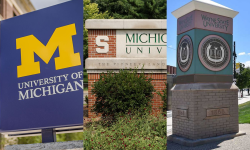Opinion | Gov. Gretchen Whitmer’s new education agency carries dangers
Gov. Gretchen Whitmer recently announced the creation of a new state department with policy authority that will span early childhood through higher education. The newly created Department of Lifelong Education, Advancement, and Potential is a big change for education policy in Michigan, and it might not all be for the good.

The new department will include an Office of Higher Education. The state government is inserting itself directly into higher education policy and governance for the first time. This move may violate the Michigan Constitution. And the new department would also open Michigan's four-year universities and community colleges to the political steering we've seen in other states with more centralized governance structures like Florida and Texas.
When I teach about higher education governance in graduate seminars at Michigan State University, we go through the various models. Some states have coordinating boards, and others have system-wide governing boards. Then there's Michigan: the free-for-all of higher education governance.
The Michigan Department of Education (MDE) has no role in higher education oversight. Each public university has its own governing board (the exception being the University of Michigan system). Community colleges are also decentralized. Public four-year universities and community colleges rely on separate voluntary associations to coordinate and collaborate. This decentralization results from "constitutional autonomy," which gives public universities in Michigan substantial independence from the state. The University of Michigan, Michigan State University, and Wayne State University have an extra layer of freedom through the direct election of their governing boards.
My students are often stunned to learn how chaotic higher education governance appears to be in the state. So the rationale for a Department of Lifelong Education is clear. Decentralization creates inefficiencies and competition among public universities.
Coordination among K-12 schools, community colleges and public four-year universities should also be improved.
Some states, like California, have statewide agreements on transfers from community colleges to public universities. Michigan doesn't. Gov. Whitmer is right to prioritize education and skills as key policy tools for improving Michigan's economy and quality of life. Education is also key to boosting the state's population after decades of decline. A single government agency focusing on these policy goals and coordinating among disparate stakeholders makes sense.
But I worry the costs are too high and the benefits too uncertain to justify this radical reorganization of the executive branch and potential incursion into the constitutionally protected business of Michigan's public universities.
Let's start with the constitutional question. I'm not a lawyer, and all the usual disclaimers apply. Still, a state department tasked with directing public universities may violate Michigan's Constitution by violating university autonomy. It could also dilute MDE's constitutional mandate to oversee K-12 public instruction.
I expect the general council offices at the 15 public universities in the state to be busy following Whitmer’s announcement. However, whether the universities will mount a legal challenge to the new agency is uncertain. Opposing lifelong learning to preserve the right to do whatever they want may be, as the saying goes, a bad look for the universities.
In my view, the public should be concerned with the state executive taking more power for themselves, especially at the expense of independent institutions, no matter which party is in control.
I am also concerned about what could happen when a different party is in control. The Department of Lifelong Learning creates an access point to the state government for special interests to guide the state's higher education policy.
In the past, the state government's primary leverage point was the power of the purse through the annual appropriation. A government department overseeing higher education policy shifts power from the legislature to the governor's office. It will likely expand the influence of interest groups ideologically aligned with the governor.
Right now, those groups are likely mainstream center-left think tanks and foundations — the same ones that influence Biden's Department of Education, like Arnold Ventures. But Whitmer, a Democrat, is in her second term, and Michigan has a long tradition of alternating parties that hold the governor's office. With the next governor, the far-right groups influencing higher education policy in other states could gain sway in Michigan. For example, in Florida, the state government censors professors, controls what's taught in college classrooms, and even orchestrates the partisan takeover of colleges.
It is unclear how much power MiLEAP will have, and my fears may be proven wrong. But I recently wrote about how Michigan is protected from the rank partisanship that increasingly defines higher education policy in many states. Now I'm not so sure. After all, the ideas that guide Florida Governor DeSantis's higher education agenda came from MI in the first place.
See what new members are saying about why they donated to Bridge Michigan:
- “In order for this information to be accurate and unbiased it must be underwritten by its readers, not by special interests.” - Larry S.
- “Not many other media sources report on the topics Bridge does.” - Susan B.
- “Your journalism is outstanding and rare these days.” - Mark S.
If you want to ensure the future of nonpartisan, nonprofit Michigan journalism, please become a member today. You, too, will be asked why you donated and maybe we'll feature your quote next time!




